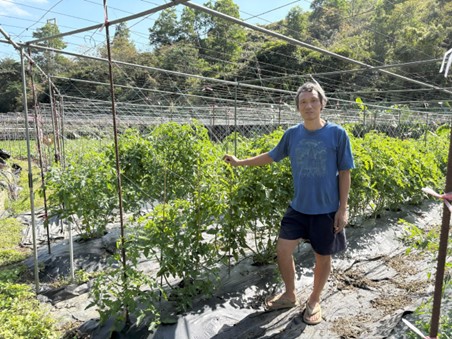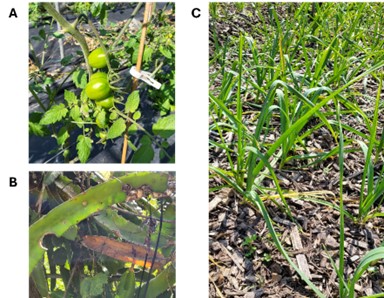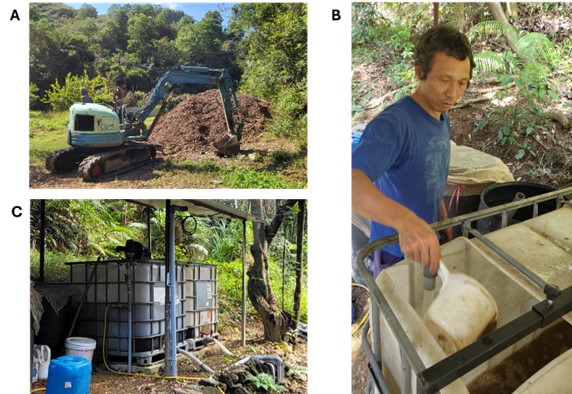What Can Hong Kong Plant Scientists Contribute to Local Farming?
Background
Hong Kong has been known as a metropolitan where financial services account heavily for the gross domestic product. Plant science research is an uncommon field in the city. However, Hong Kong does have its own farming activities. To learn more about the local farming and explore how plant scientists can engage more, Yee-Shan Ku (YS, Plantae Fellow) conducted an interview with Pat-Fan Chan (PF, 陳不凡, local farmer in Hong Kong).
YS: How did you start farming in Hong Kong?
PF: I am a second-generation farmer. My mother is a farmer, and I was raised in this area where I have my house next to the farm. I graduated from a local university majoring in Geography. After graduation, I worked in the Agriculture, Fisheries and Conservation Department of the Hong Kong Government about organic farming. Instead of being an office worker, I tried to think of other alternatives. With my background as a farmer’s son and my experience in organic farming, I tried doing my own farming. It has been about 13 years till now. (see Figure 1)

Figure 1. Pat-Fan in his farm in Sheung Shui, Hong Kong.
YS: How did you choose the crops for planting?
PF: I follow my mother’s suggestions as she is an experienced farmer. Traditionally, we follow the “24 Solar Terms (24節氣)†”. However, in recent years, following the “24 Solar Terms” raises problems due to the changing climate and unpredictable weather. The four seasons in Hong Kong have become more and more indistinguishable. [It was a 25°C “winter” on the interview day (4th Dec, 2024).] So, we just try different crops randomly, and it sometimes works. The outcome is usually better than following the “24 Solar Terms”! [On the interview day, crops like tomato, dragon fruit, and garlic plants are growing in the farm (see Figure 2).]

Figure 2. Tomato (A), dragon fruit (B), and garlic (C) plants are growing in Pat-Fan’s farm. (B) The dragon fruit plants are infected with fungi. Pat-Fan is still finding the solutions to save the plants. (C) Pat-Fan applies the self-made wood chip compost to grow garlic plants.
YS: Where do you sell the vegetable?
PF: When I just started farming, I usually sold the vegetable to the Vegetable Marketing Organization which is a non-profit organization in Hong Kong. The organization then sells the vegetable to distributors, restaurants, and individual customers. After several years of farming, I have customers who know me and directly buy vegetable from me. On Sunday, I sell the vegetable in the local farmers’ market. Compared to vegetable transported from mainland China, vegetable from local farms is usually fresher. It tastes really good! Many of my customers are young families who choose healthy food for their kids.
YS: Can you share some tips to manage a farm?
PF: It is hard, but you have to take it easy. Here we have strong sunshine, heavy rain, various bugs…and these are what you need to cope with. Unexperienced farmers usually have difficulties getting good yield. It is important to learn from old farmers. They are able to sustain the business over many years for a reason! There are too many variables in a farm. Theories are good but they may not fit the actual environment. Experiences from old farmers really help.
YS: While the experiences from old farmers are precious, what can young farmers bring into the field?
PF: The younger generation is usually more educated and open-minded. They have more exposure to new farming practices such as the uses of compost and self-made microbe-based fertilizer. Compared to old farmers who may not know how to use computers, the younger generation can learn diverse techniques by surfing the internet. The younger generation usually have better problem-solving skills. I make compost, prepare microbe-based-fertilizer, and build the irrigation system by myself (see Figure 3)!

Figure 3. Pat-Fan makes wood chip compost (A), prepares microbe-based-fertilizer (B), and builds the irrigation system (C) by himself. (C) The microbe-based-fertilizer is transported in pipes for irrigation on the farm.
YS: What can universities contribute to local farming?
PF: Educating the public is important. In Chinese, we have a saying that “do not eat what are not harvested in the right season (不時不食) ”. In Hong Kong, we can always find different vegetables in supermarkets year-round because we import a lot from various countries. However, for local farming, crop availability is dependent on the season. Since we can easily find different vegetables in supermarkets, many people do not understand why local farms cannot supply whatever vegetables they want. Also because of the ease to buy different vegetables, many people do not understand the time and effort needed to grow crops. Educating the public about the optimal seasons and timeframe to grow crops can facilitate our work.
YS: Do you have anything to tell Plantae readers?
PF: Hong Kong has local farming! The changing and unpredictable weather here is a big problem, and it is important to ensure food security. Researchers can suggest suitable crops to be grown under the changing climate. We are also willing to try novel agronomic practices as well as newly developed fertilizers and pesticides. However, the application process has to be made easy enough for farmers to follow.
Summary
- Climate change is challenging local farming. Research on suitable crops to be grown under the changing climate will be useful.
- Plant scientists can investigate novel agronomic practices as well as climate-friendly fertilizers and pesticides. Farmers will be able to try with them if the application process is easy.
- Plant scientists can also educate the public about the optimal seasons and timeframe for crop growth.
†24 Solar Terms (24節氣): Based on the Sun’s position, ancient farmers in China gave 24 terms to specific days in a year. Each term reflects different climatic conditions to guide farming activities. For example, 5th June, 2025 will be the day of “Mang Zhong (芒種)”, which is translated to “Grain in Ear” in English. According to the tradition, on this day, wheat will ripen and summer planting in Southern China will start.
Acknowledgement: Yee-Shan would like to thank Miss Tsz-Yan Chan for modulating the interview.
______________________________________________
About the Author
Yee-Shan Ku is a Post-doctoral researcher at The Chinese University of Hong Kong and a 2025 Plantae Fellow. She is interested in comprehending life sciences at the molecular level. Her research focuses on plant-microbe interaction. X: @YeeShanKu1



